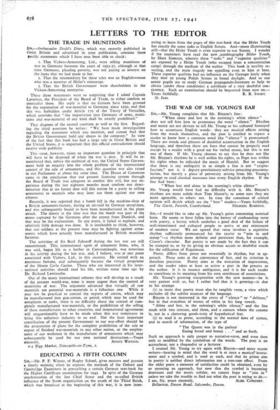Snt,—I would like to take up Mr. Young's point concerning
metrical form. He seems to have fallen into the heresy of confounding verse with poetry, a heresy which underlies a good deal of the failure of well-intentioned and cultured people to arrive at any enjoyment of modern verse. We are agreed that verse involves a repetitive rhythm sufficiently pronounced for the reader to " join in and stamp "—a rhythm more definite and persistent than, for example, Cicero's clausulae. But poetry is not made by the fact that it can be stamped to, or by its giving an obvious accent to doubtful words for the edification of Esquimaux.
Poetry differs from prose not essentially in rhythm, but in ap- proach. Prose aims at the conveyance of fact, and its criterion is therefore precision. Poetry aims at the evocation of impressions, and the reader takes at least as active a part in the process as the author. It is in essence ambiguous, and it is for each reader to contribute to its meaning from his own storehouse of associations.
Mr. Young's growing exasperation with the new manner—he is very patient with us, but I rather feel that it is growing—is due to his attempt
00 to insist that poetry must also be tangible verse, a view which excludes all the subtler nuances of the language.
Binyon is not interested in the stress of " silence " or " defence," but in that evocation of wastes of white in his long vowels.
" Alone and lost, in the morning's white silence," and the line reads with two stresses, and three, and a caesura where the comma is, not in a clattering goods-train of hypothetical feet.
(2) to read it as prose, according to the normal laws of syntaX, and in search of information, of the type of
" The Queen was in the parlour Eating bread and honey . . ." and so forth.
Such an approach is only proper to narrative-verse, and even then only as modified by the symbolism of the words. The poet is an accoucheur, not a rhapsodist or a lecturer.
I counsel Mr. Young to try again with Binyon—and more recent writers—bearing in mind that the word is at once a musical' instru- ment and a symbol, and is used as such, and that its prime aim in poetry is neither direct information nor a tom-tom effect. From the older poets a measure of satisfaction could be obtained, even by so unseeing an approach, but now that the symbol is becoming dominant and the music subtler, we cannot hope to " join in " unless we take the trouble to find out what the poet is trying to do.— I am, Sir, yours sincerely, ALEX. COMFORT. Bellavista, Devon Road. Salcombe, Devon.






















 Previous page
Previous page